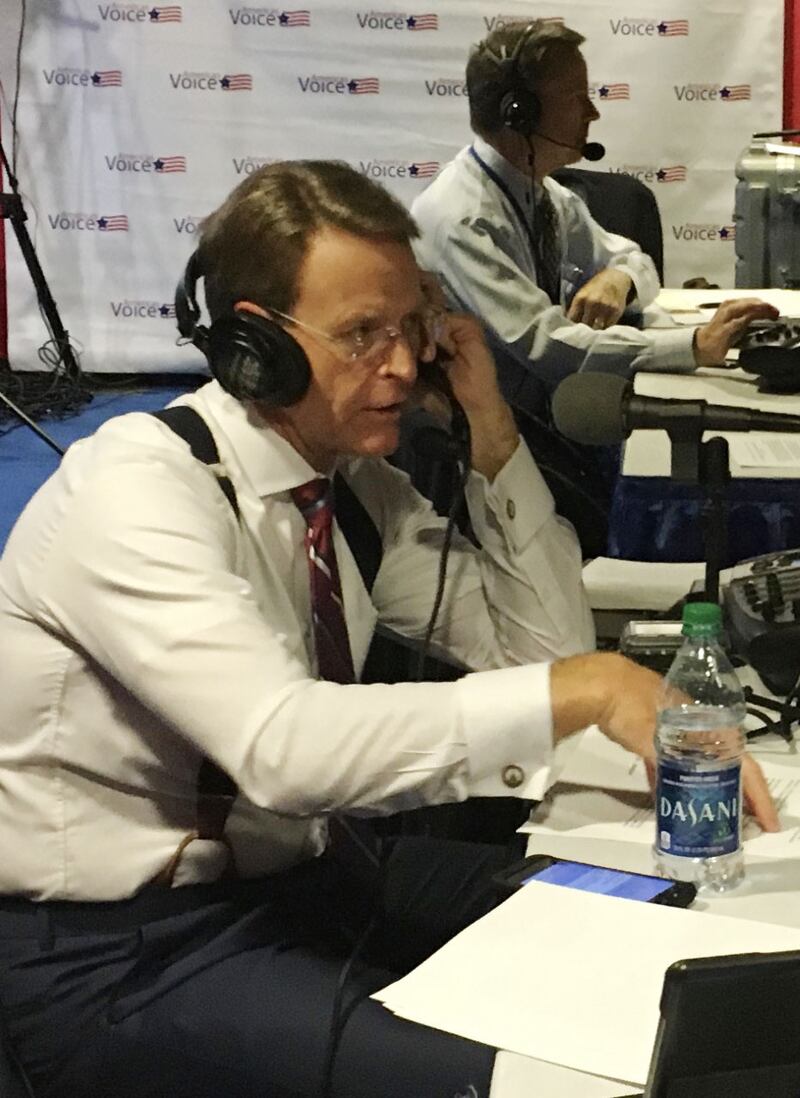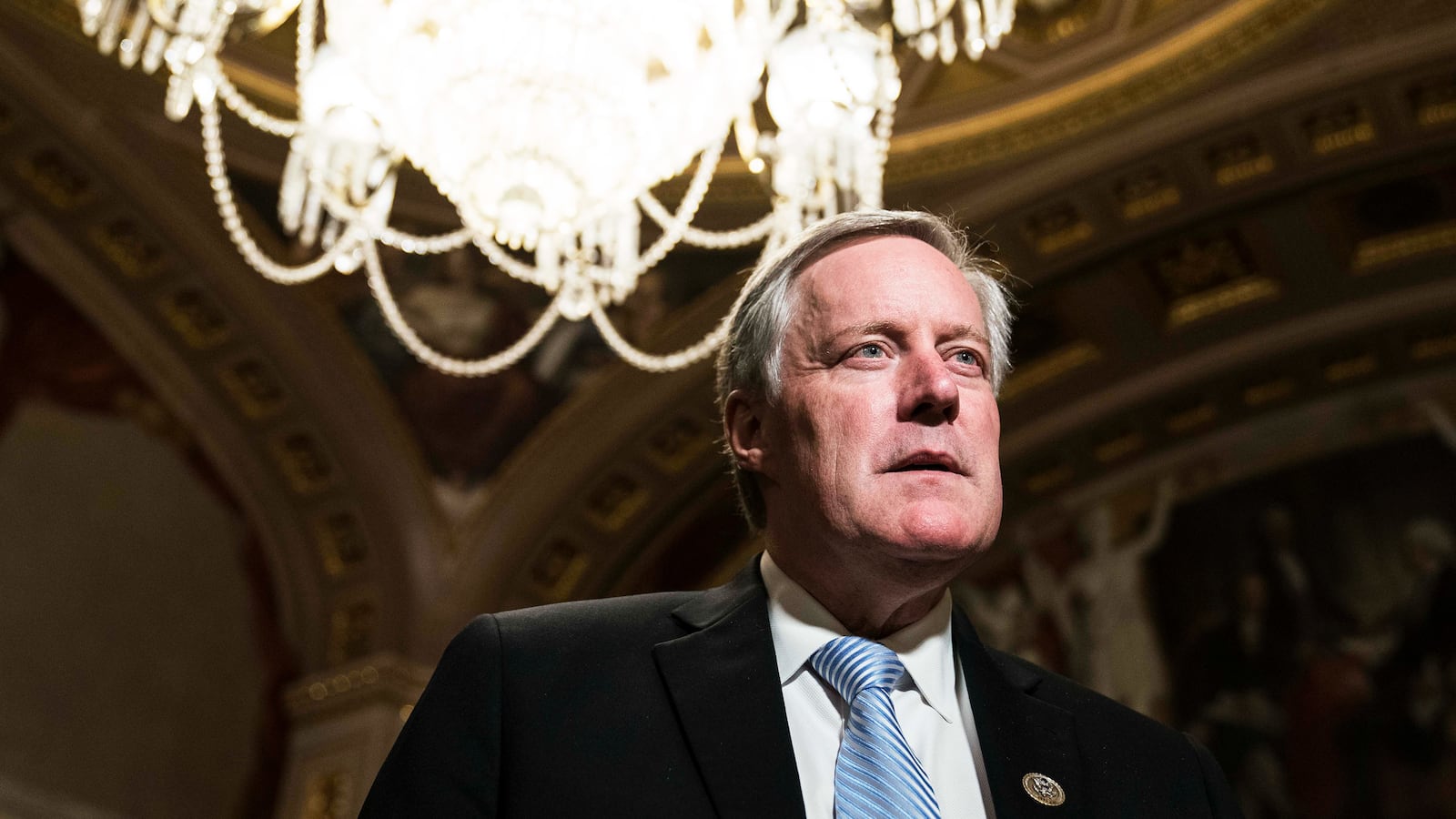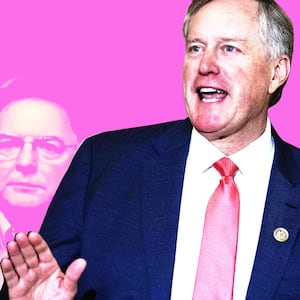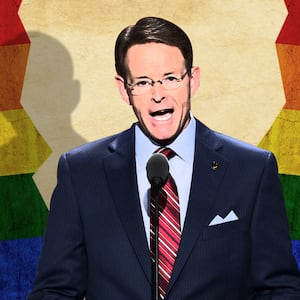This month the White House confirmed that Donald Trump was assembling a new coronavirus task force to oversee the reopening of the economy, headed by his new chief of staff, former Rep. Mark Meadows. The announcement came amid Trump’s disputes with his medical task force, especially infectious disease expert Dr. Anthony Fauci, over when to reopen the economy.
Meadows’ new task force will allow Trump to cite a second opinion on the matter—one that will, presumably, back him up. As chief of staff, Meadows is expected to advise the president on policy and political affairs, run interference with Trump family members, and mediate relationships on Capitol Hill.
But Meadows’ deeper purpose may be to serve as the White House’s point man with a coalition of fundamentalist and economic interests as they extend their influence in the administration—and to keep them solidly on board for the election.
Meadows replaced former Rep. Mick Mulvaney, who struggled to manage the political fallout from the impeachment proceedings. At first glance Mulvaney and Meadows had much in common: both Southern Republicans (Mulvaney from South Carolina, Meadows from North Carolina) active with the conservative Freedom Caucus. But there were significant differences as well. Mulvaney held traditional credentials, with degrees from Georgetown and Chapel Hill.
Meadows’ record was more questionable. Until December 2018, his office identified him as holding a bachelor’s degree from the University of South Florida, but he was revealed to have only completed a two-year associate’s degree. In November 2018 Meadows was fined by the House Ethics Committee for failing to take adequate action against a staff member who violated rules of conduct.
But Meadows had other factors in his favor, namely the backing of a powerful network of fundamentalist organizations, including the group he has credited with launching his career—the Family Research Council. At the center of this network stands fundamentalist power broker Tony Perkins, until recently president of the Council for National Policy, whose past and present members include Steve Bannon, Kellyanne Conway, Jay Sekulow, Charlie Kirk, and Supreme Court spouse Ginni Thomas. (Mulvaney received a letter of support from Perkins and his counterparts last October, but as a Catholic, he has been a step removed from the fundamentalist groups.)

"Tony Perkins, President of the Family Research Council"
Anna NelsonThe CNP is an umbrella organization. In the words of former CNP president Richard DeVos, it coordinates the “donors and doers” to advance the political activities of organizations ranging from the National Rifle Association to the anti-abortion Susan B. Anthony List.
Perkins also serves as president of the Family Research Council, a fundamentalist policy and lobbying group that oversees a “ministry” of pastors called Watchmen on the Wall. Meadows has long been a Family Research Council favorite. On Oct. 13, 2017, he posed for a photo-op with fellow speakers Perkins and Trump at the FRC’s Values Voter Summit, which brings hundreds of supporters to Washington every year for speeches, prayer, and workshops on political campaigning. (Trump was the first sitting president to address the group, and Mike Pence is a regular speaker on its media and conference circuit.) Meadows has appeared repeatedly as a guest on Perkins’ daily radio show, Washington Watch.
Perkins has written that he has known Meadows and his wife “since arriving at the Family Research Council [in 2003], as they were supporters of FRC and quickly became close friends.” Meadows and Perkins celebrated their political partnership on May 24, 2018—five months before the midterm elections—when Meadows joined Perkins at the annual meeting of the Watchmen on the Wall.
Perkins’ introduction described how Family Research Council Action, his organization’s lobbying arm, jump-started Meadows’ political career with the 2012 Congressional campaign: “I remember after one of our events, he came and said, ‘Tony, I think the Lord’s calling me to run for Congress.’ And I said, ‘If you’re certain about that, we will stand with you.’ Our action arm did, and he won his election.”
Meadows was also endorsed by Michael Farris, a member of the CNP’s Board of Governors and the President and current CEO of the Alliance Defending Freedom. In Tony Perkins’ words, the FRC and the ADF “work hand-in-hand,” with the ADF providing legal counsel for anti-LGBT and related cases, while FRC works “on the policy side.”
Meadows acknowledged the pastors’ political influence. “Perhaps your congregations want you to keep quiet from the pulpit. Perhaps your congregation says, ‘Well, we don’t want to get political.’ And you know what, if you decide to yield to that, I can tell you that you’re not hearing from our heavenly father. Because if you censor your own speech, the enemy has already won, guys.” Perkins praised Meadows as chairman of the Freedom Caucus for “leading a band of conservative warriors.”
The FRC’s Watchmen on the Wall claims over 76,000 members in its “pastor network,” including thousands concentrated in swing states such as Arizona (1,555), Michigan (2,040), and North Carolina (6,294). Family Research Council’s lobbying arm provides partner churches with its iVoter guides for national and state elections, which are inserted in church bulletins.
The ratings favor of pro-life candidates who oppose the Affordable Care Act, gun control legislation, and the “homosexual agenda”—meaning, not surprisingly, consistently conservative Republicans. Mark Meadows’ 2018 iVoterGuide listed support from an array of Council for National Policy partners and reported that Meadows was a donor to the Family Research Council.
The organization collects church directories, which are then cross-referenced with voting records to determine which voters to encourage to go to the polls. Pastors and congregants have been encouraged to download the FRC’s “Stand Firm” mobile app, developed on the same uCampaign template as apps for the National Rifle Association and the Susan B. Anthony List (also headed by members of the Council for National Policy). These apps have been used to mobilize churchgoers for lobbying and get out the vote activities.
Evangelicals made up a crucial bloc of Trump voters in 2016, and Trump rewarded Perkins with a role in drafting the Republican platform, a place on his Evangelical Advisory Board, and the chairmanship of the U.S. Commission on International Religious Freedom.
Trump has made the relationship a priority for his 2020 campaign. On March 20—the same day New York and Illinois joined California in statewide stay-at-home orders—Trump, Mike Pence and Ben Carson took part in a conference call with Perkins and 700 pastors from the FRC’s Watchmen on the Wall “ministry.” No other one-on-one interviews were listed on the White House schedule that week.
Trump used the occasion to make a campaign pitch. Perkins asked Trump, “What would you like these pastors to be praying most for you at this time?” For the health and strength of the country, Trump replied—but also, he quickly added, “that we make the right choice on Nov. 3.” Perkins distributed the call to another 15,000 pastors in the Watchmen on the Wall national network and posted it on the FRC website.
Four days later, Trump told Fox News, “I would love to have the country opened up, and rarin’ to go by Easter.” He added, “You’ll have packed churches all over our country… I think it’ll be a beautiful time.” It was only after the intervention of Fauci and immunologist Deborah Birx that Trump backed down. Trump, a nominal Presbyterian, hosted an Easter blessing in the White House by Pentecostal Bishop Harry Jackson—a longtime member of the CNP and Watchmen on the Wall—as 42 states imposed lockdowns and US COVID-19 deaths approached 22,000.
Tony Perkins has celebrated his “privilege of watching and walking alongside Mark [Meadows] in what has been an impactful and God-honoring journey,” and Meadows can count on his ongoing support. As the Trump administration juggles the trifecta of corona, economic crisis, and upcoming elections, evangelical voters will be more important than ever, especially in critical swing states. It will fall to Mark Meadows, as White House chief of staff, to keep the balls in the air—and keep his co-religionists on board.
Anne Nelson is the author of Shadow Network: Media, Money, and the Secret Hub of the Radical Right (Bloomsbury, 2019), and research scholar at Columbia’s School of International and Public Affairs.








